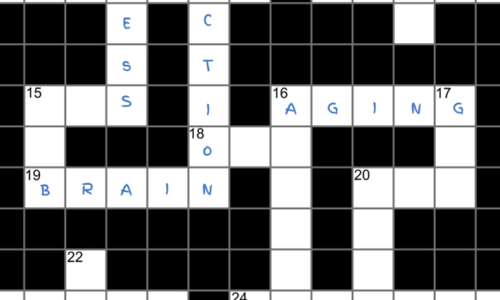NEW YORK — What’s a 10-letter word for better brain performance? A new study finds that crosswords are better at preventing memory loss than playing video games.
Researchers from Columbia University found that older adults doing web-based crossword puzzles showed greater improvement than those training their brain with video games. Word puzzles are an everyday activity for many people, but their effect on mild cognitive impairment, associated with Alzheimer’s disease, has not been studied systematically.
“This is the first study to document both short-term and longer-term benefits for home-based crossword puzzles training compared to another intervention,” says Dr. D.P. Devanand, who oversees brain aging and mental health research at Columbia, in a media release. “The results are important in light of difficulty in showing improvement with interventions in mild cognitive impairment.”
The research team randomly assigned 107 participants with mild cognitive impairment to either crossword puzzle training or cognitive video game training. They completed intensive training for 12 weeks, followed by 78 weeks of booster sessions which participants accessed through a computer at home.
Crossword players score better on cognitive tests
The results, published in the journal NEJM Evidence, showed that crossword puzzles were superior to video games, according to scores on the most common cognitive test, ADAS-Cog, at weeks 12 and 78.
They were also superior when researchers measured the results using FAQ, a test of daily functioning. Additionally, doing puzzles was more effective for participants in the later stages of disease, though both methods were equal at earlier stages. Crosswords also resulted in less brain shrinkage (measured with MRI scans) after 78 weeks.
“The benefits were seen not only in cognition but also in daily activities with indications of brain shrinkage on MRI that suggests that the effects are clinically meaningful,” Dr. Devanand says.
The study author adds the research also highlights the importance of engagement. Based on remote electronic monitoring of computer use, participants at a later stage of cognitive impairment may have engaged better with the more familiar crossword puzzles than with computerized cognitive games.
There was a low drop-out rate (15%) for such a lengthy home-based trial, and the team notes 28 percent of the individuals were from ethnic minorities. However, there was no control group and the authors of the study stress the need for a larger controlled trial before making further conclusions.
“The trifecta of improving cognition, function and neuroprotection is the Holy Grail for the field,” says Dr. Murali Doraiswamy, professor of psychiatry and medicine at Duke. “Further research to scale brain training as a home-based digital therapeutic for delaying Alzheimer’s should be a priority for the field.”
South West News Service writer Danny Halpin contributed to this report.


terimakasih infonya menarik sekali